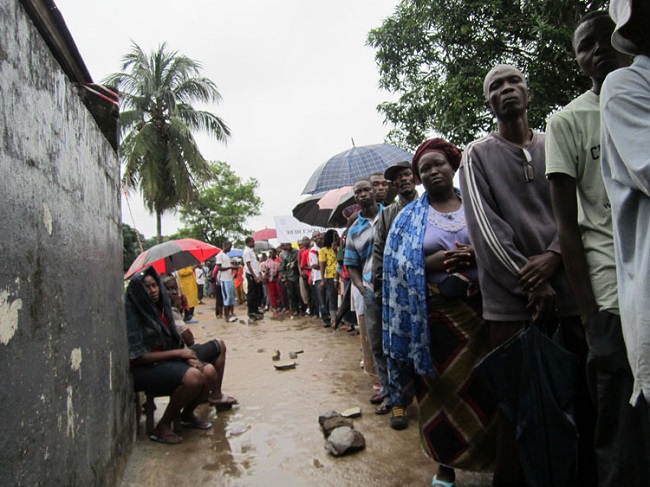African electorates: the Liberian way

Liberians line up to vote in 2011
Photo: ushahidi.com
The electorates are those who stand in the queues to make history happen; Baba Sillah writes.
They are often charmed by lofty promises of positive change and are wont to easily trusting sometimes as the aphorism goes: ‘Not the ones who make the most sense but those who say the most platitudes or spend the most money’.
Contemporary Liberian politics can be likened to a corporation that is verging on the precipice of going down under and some politicians like venture capitalists that are willing to take the risk of making minimum investment with the hope of reaping maximum returns should they be successful.
The quirk of fate here then is the reality that the electorates who should serve as a buffer between power or in the above scenario the ‘corporation’ and the politicians or the ‘venture capitalists’ are the ones who are most susceptible to playing into the hands of the politicians.
The electorates are often too uncritical with politicians who swarm upon them to quarry their support for elective offices. They are quickly enticed by mediocre community projects and crafty political scholarships and give their votes up, in order words, mortgaging theirs and their children’s future before contemplating the consequences. They fail to realize that if they could just be much more critical, determined and stern not just in electing their leaders but in putting love for particular candidates and parties aside as often as necessary and putting country first, they wouldn’t be needing little crafty-political-scholarships for themselves or their children from because they would in essence be creating a system to cater for the greater good of the people.
But sadly, in their patent uncriticality they dole out their votes to ‘venture capitalists’ than only after a while when the polls are closed and results announced, the awakening rudely dawns, as the rosily painted picture shatters. The voice on the radio says “no magic bullets and no quick fixes,” “expectations must be managed against the realities of the time.” Declarations such as these are typically symptomatic of the difficulties the people are to face. However, second thoughts suddenly start to emerge, and not after long, the electorates start to lament their own prescriptions. They are now left bemused by a post-electoral state of affairs far removed from the campaign promises by which they were so mesmerized. Through frustration, a deep sigh of resignation is lent the so-called “wait until the next administration” attitude. With a litany of complaints, grumblings and despondency on their minds, their lips begin to seep with questions:
Where are the roads to link our towns and cities, farms to markets?
Where are the quality schools they promised to educate our people?
Where are the new jobs and better salaries?
What is happening with the war against corruption?
Why are allegations of corruption not investigated to logical conclusion?
What is wrong with agriculture, and food sustainability?
What is wrong with our leaders do they really care about us?
What about pipe-borne water and electricity, don’t we deserve them?
Why are most of our presidents imperial, do they just love power?
Why are our natural resources being depleted without much benefit to the local communities?
Why must our presidents go abroad to seek healthcare?
Quickly retorted, their questions are rubbished as uninformed and delusional. Thus they find themselves entrapped in the cross-currents of the political debates between the administration and oppositions, being buffeted with blames by both sides, as they struggle under the weight of the parlance of governance: institutionalism, recession, right sizing, national vision, austerity measures, capital investment, structural impediments to growth, national brand, budget short fall, gradualism, among others.

Sillah writes that the electorate is not critical of politicians
Interestingly, polemics abound as spin doctors and wordsmiths, whether from the administration or the oppositions bombard the electorates, many of whom are illiterate with complex theoretical narratives. The electorates are also lampooned by the oppositions for choosing the wrong prescriptions and equally rebuked by the administration and depicted as unappreciative ingrates with little use for patience.
Devastated by the outcome of their own prescriptions they crave for the day when they can right the wrongs. But the period when craving for the day to right the wrongs is even more critical than the day for righting the wrongs. This is so because the significance of reaching a consensus on who leads a country is a decision too enormous to be made on Election Day alone. While all the processes that precede elections are essential, what should be the most fundamental concern for the electorates is having a qualitatively understanding of the platforms of the various candidates and the capacities of the candidates to deliver on their propositions. As candidates are single individuals, it is also imperative that the electorates scrutinize those who are known to have close political relationships with them and those who inform their decisions and play advisory roles.
The people themselves must reshape and take control of the debate, the African electorates need to depersonalize the debate and make it issues-centric through asking the following questions for example:
What quality of education are candidates proposing for all levels of students (primary, secondary, tertiary, and technical and vocational education), how are they articulating those proposals, and how are they going to achieve those objectives?
What jobs and standards of living do candidates desire for their people electorates and what skills and preparedness do they wish to see their citizens possess to ensure fruition?
What capital investments candidates would like to see being made in the economy to facilitate the creation of light industry , generate value addition, capital expansion as well as employment opportunities? And how they plan to achieve those?
What plans candidates have for ensuring that the fight against corruption transcends the creation and in some cases revival of anti-graft , anti-corruption and other integrity institutions to placing emphasis on operating in line with rule consistent behavior, where the state moves from commitment to compliance in protecting the resources of the people?
Change will remain an illusion until the people build consciousness and transform their society through purpose-driven actions. Yes, it is possible for different segments of the society to pursue varying positive goals and to homogenize those various goals into cumulative positive national transformation objectives. But this is only possible when the people know what they want! Battle cries, rice, t-shirts are very transitory thus, the electorates must begin to look into the future and be dissatisfied today with the fact that, if they don’t make the right decisions the people in West Point, Soniwehn, Sargent Kollie Town, Wohn, Kpelleh Jacob Town, and other places across the length and breadth of Liberia, Africa’s Lone Star, will be worse off in years to come.
I once wrote that, Liberia can bleed from our collective stab or reap from our collective investment. Individual egos and selfish desires to succeed must not lead the people to shortchange themselves.

